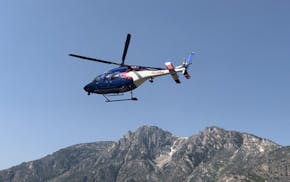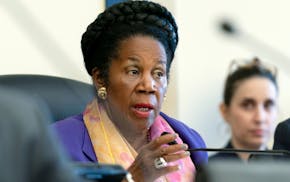WASHINGTON – A new bipartisan report on the Jan. 6 U.S. Capitol attack details disorganization, intelligence failures and lack of preparation by federal agencies and law enforcement tasked with protecting the building and people inside.
The report, led in part by Minnesota Sen. Amy Klobuchar, paints a picture of missed clues and communication issues in the run-up to the Capitol riot, with severe repercussions during the actual attack by rioters trying to overturn President Donald Trump's election defeat.
"The failures are obvious," Klobuchar told reporters in a briefing. "To me it was all summed up by one of the things in our report where one of the officers was heard on the radio that day asking a tragically simple question. 'Does anybody have a plan?' Sadly, no one did."
The investigation found a patchwork approach in the lead-up to the insurrection that showed varying degrees of intelligence over the prospects of violence on the day lawmakers met to certify President Joe Biden's Electoral College victory. Once it was clear that the Capitol was under siege, the report found an array of bureaucratic and logistical problems that hindered efforts to control and repel the rioters.
The report comes as the events of Jan. 6 have led to fierce partisanship and fraught emotions within Congress as some figures in the GOP downplay the violent attack.
It recommends major reforms. But in what was described as a limited scope, the report did not delve into Trump's role in the attack. It did, however, include a complete transcript of the speech the former Republican president gave to supporters ahead of the attack "for context," Senate committee aides said. The report also does not label attackers as insurrectionists or describe the events of Jan. 6 as an insurrection, outside of quotes and citations.
Tuesday's release is a product of bipartisan work between Klobuchar, a Democrat who chairs the Senate Rules Committee, fellow Democrat and Senate Homeland Security chairman Michigan Sen. Gary Peters and the ranking Republican members on those two committees.
Among other changes, the two committees recommend that the U.S. Capitol Police chief be able to ask for D.C. National Guard support directly in an emergency, rather than waiting for a board to approve the request. The Department of Defense deployment protocol, which caused a three-hour delay between a call for help and the actual arrival of troops at the Capitol, must be streamlined, the committees said.
"Let's be honest, Capitol Hill police were put in an impossible situation without adequate intelligence, training and equipment, they didn't have the tools they needed to protect the Capitol," said Ohio Sen. Rob Portman, the ranking Republican on the Homeland Security and Governmental Affairs Committee.
In his joint committee interview, former Acting Defense Secretary Christopher Miller denied Trump's involvement in slowing the deployment.
Senate committee aides pointed out that "the report indicates that Secretary Miller said he had all the authority he needed to activate and deploy the D.C. National Guard and that President Trump had concurred."
The report also calls for all Capitol Police officers to be trained each year in how to respond to civil disturbances.
Every officer should be issued "ballistic helmets, gloves and gas masks" the report said. A large number of Capitol Police "officers who fought to defend the Capitol were left to do so in their daily uniforms," the investigation found.
Intelligence agencies were also called on to rethink how they handle threats of violence discovered on social media, the report said, after finding that "neither the FBI nor DHS deemed online posts calling for violence at the Capitol as credible."
Even within Capitol Police, the report found their "intelligence components failed to convey the full scope of threat information they possessed." The day of violence left around 140 law enforcement officers injured after attacks that ranged from the use of chemical irritants to physical objects that included flagpoles and fence pieces, according to the report.
In a statement after the report's public release, U.S. Capitol Police noted that "the USCP consumes intelligence from every federal agency. At no point prior to the 6th did it receive actionable intelligence about a large-scale attack."
"Neither the USCP, nor the FBI, U.S. Secret Service, Metropolitan Police or our other law enforcement partners knew thousands of rioters were planning to attack the U.S. Capitol," said Capitol Police. "The known intelligence simply didn't support that conclusion."
The report's release comes shortly after most Senate Republicans blocked legislation to create an independent commission to investigate the events of Jan. 6. Last month, the House passed the bill on a bipartisan vote with 35 Republicans joining Democrats, including Minnesota's four Democratic members, in voting yes. Minnesota's four GOP lawmakers opposed the legislation. Two of them, Rep. Jim Hagedorn and Rep. Michelle Fischbach, objected to certifying Biden's win after the insurrection.
Even with six GOP defections in the Senate to start debate on the bill, and the support of Klobuchar and fellow Minnesota Democratic Sen. Tina Smith, the legislation failed to clear the chamber's filibuster threshold of 60 votes to move forward. The House also narrowly passed a spending bill last month to improve Capitol security.
Democratic Rep. Ilhan Omar joined Minnesota's Republicans in voting against that measure, and its future in the Senate is bleak given the GOP opposition.
Klobuchar said in an interview her job now is to implement the report and emphasize oversight efforts. Yet work related to the Jan. 6 attack is far from over for the Minnesota Democrat.
"We continue to push for some type of a commission," she said. "But for now, my job is to get the security ramped up."
Jim Spencer • 202-662-7432
Hunter Woodall • 612-673-4559

JD Vance, an unlikely friendship and why it ended

Lewis Lapham, editor who revived Harper's magazine, dies at 89

Body of missing Minnesota hiker recovered in Beartooth Mountains of Montana
Mike Lindell and the other voting machine conspiracy theorists are still at it

